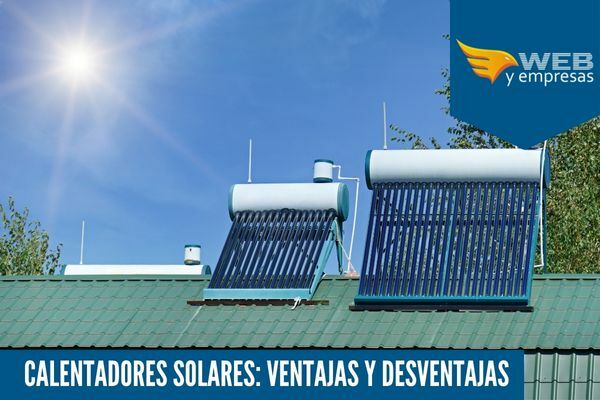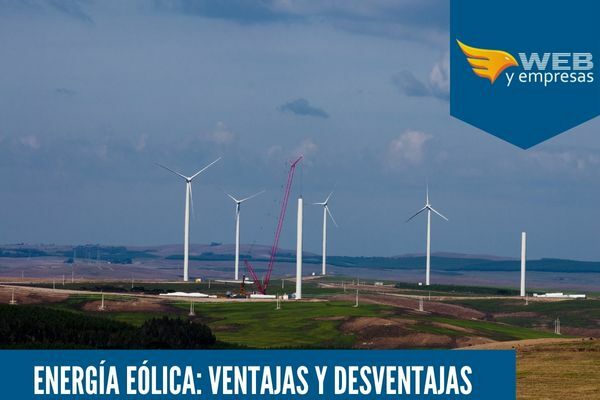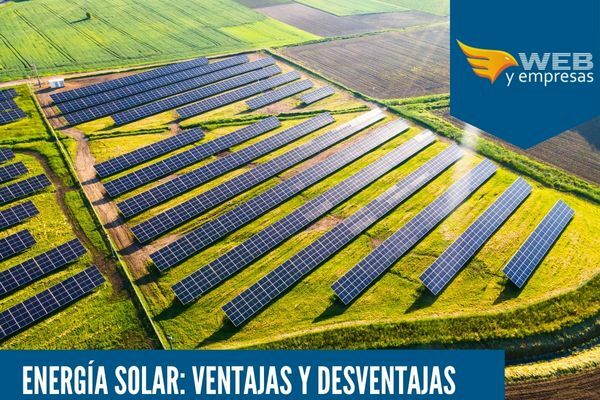The solar heaters They are a system that uses the heat energy of the sun. to directly heat water that is pumped to homes or industries, without the need for gas, electricity or milk, which helps save money on heating, as well as contributing to the environment through completely clean and renewable energy.

Advertisements
These solar heating systems are very efficient and have a long service life, which makes these a very viable alternative to reduce dependence on fossil fuels; however, it is a source of energy that, as well as its advantages, has its disadvantages, such as those described in the following table.
| Advantages |
Disadvantages Advertisements |
| Energy saving. | High initial cost. |
| Greater energy efficiency. | It has geographic limitations. |
| Low operating cost. | It requires a backup system. |
| Long useful life. | It occupies a lot of outdoor space. |
| Reduction of greenhouse gas emissions. | It needs maintenance. |
| Easy maintenance. | Difficult to repair. |
| They are very versatile. | It requires specialized technical knowledge. |
| Reduces energy dependence. | Negative visual impact. |
As can be seen in the table, the use of solar heaters brings with it advantages and disadvantages, Let's see what they are about, but not before defining what these systems consist of.
Advertisements
In this article you will find:
What are solar heaters?
Solar heaters are systems that use the solar energy to heat water for domestic or industrial use; these systems consist of solar collectors, which capture solar energy and transfer it to flowing water through them, and once the water is heated, it accumulates in a storage tank for later use.
Solar heaters are one efficient and economical way to generate hot water and they are a sustainable alternative to traditional heating systems that use fossil fuels. In addition, they do not emit greenhouse gases and require very little maintenance.
Advertisements
8 Advantages and disadvantages of solar heaters
Solar heaters are an excellent tool to produce alternative energy for the heating, but as well as advantages, its implementation also has disadvantages or limitations, such as:
Advantages
Energy saving: By implementing these systems, electricity and gas costs are significantly reduced by heating water, whether for cooking, showering or other uses, both domestically and industrial.
Advertisements
Greater energy efficiency: They are much more efficient than other energy sources, since it takes advantage of solar energy that is completely free, clean and renewable, to generate caloric energy with it with excellent results.
Low operating cost: Once the entire solar heater system is installed, its daily operation does not imply any cost, only indirect costs of maintenance once every three years, and periodic cleaning of the collectors to eliminate society and guarantee their energy efficiency and durability.
Long useful life: Solar collectors are designed to have a useful life of several decades between 20 and 25 years, although their Durability may vary depending on the maintenance that is carried out, which, although few are required, are very necessary.
It also depends on each part that makes up the system, for example, if the supply pump is damaged, it is not necessary to replace the entire system, you just have to change the pump and that's it.
Reduction of greenhouse gas emissions: The use of solar energy and the process of heating the water with the solar heating system does not emit CO₂ or any carbon dioxide. greenhouse effect, and does not generate waste that could harm the environment, which makes them a highly ecological alternative.
Easy maintenance: The solar heating system is very easy to maintain, since they are specially designed to resist weather conditions, which makes them very resistant.
It only requires maintenance every three years for the complete system, collectors, piping system, pumps, storage tanks and others. components to guarantee their durability, in addition to periodic cleaning of the solar collectors on the external surface to remove the dirt.
They are very versatile: Although water heaters can only be used to heat water, it can supply hot water to different areas of the house, kitchen, showers, swimming pools, or others, it can even be used for industrial purposes, making them very versatile.
In addition, it does not alter the natural composition of the water, therefore, it does not affect its quality for human consumption.
Reduce energy dependence: By generating heat energy to maintain the hot water supply, the need for depend on other sources of energy, such as gas, electricity or the burning of biomass, such as firewood.
Disadvantages
High initial cost: The main disadvantage of solar heaters is that they require a high initial investment to buy and install the equipment; because in addition to solar collectors, they require electric pumps, a piping system, among other components, and a specialized technical team for their installation.
It has geographical limitations: The effectiveness of solar heaters depends on the availability of sunlight, so they can be less efficient in geographical areas. with little sunlight, or depending on weather conditions, since in rainy or foggy seasons the intensity of solar radiation is minor.
Requires a backup system: Solar heating systems require a backup system to provide additional heat to domestic hot water if needed. This is because, on days with little sunlight, solar heaters may not generate enough hot water to meet demand.
It occupies a lot of outdoor space: Like the solar panels, solar heaters also require a lot of outdoor space to capture energy from the sun during most of the day and heat the water, which is why they are generally installed on the rooftops.
Difficult to repair: Although solar heaters are made to be highly resistant, solar collectors or thermal collectors are very difficult to repair, and require specialized technical personnel to assess the magnitude of the damage, since, despite their resistance, they are susceptible to damage caused by fires or natural disasters such as hurricanes.
Although other parts of the system are easy to replace, such as pumps and pipes.
Requires specialized technical knowledge: Solar heating systems require a specialized technical team for their installation, as well as their maintenance every three years, in this way it is guaranteed that the entire system works correctly at its levels optimal.
Negative visual impact: Solar heaters are large in size that must be installed in external areas such as roofs, generating a negative visual impact, since it affects the aesthetics of the failures of houses, buildings or patios.


